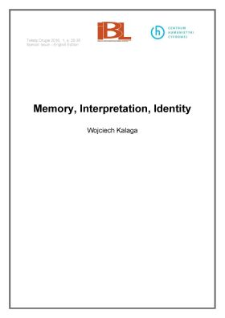- Search in all Repository
- Literature and maps
- Archeology
- Mills database
- Natural sciences
Advanced search
Advanced search
Advanced search
Advanced search
Advanced search

Object
Title: Memory, interpretation, identity
Subtitle:
Vol. 2 (2014) - Special Issue - English Edition
Publisher:
Place of publishing:
Description:
21 cm ; Pol. text, eng. summary
Type of object:
References:
1. Aristotle, On Memory and Reminiscence, trans. J. I. Beare, eBooks@Adelaide 2007, accessed November 30, 2011, http://ebooks.adelaide.edu.au/a/aristotle/memory/
2. St. Augustine, Confessions, trans. Ed. Bouverie Pusey (Edward Bouverie), accessed March 15, 2016, www.gutenberg.org/files/3296/3296-h/3296-h.htm#link2H_4_0001.
3. H. Bergson, The Creative Mind, trans. M. L. Andison (New York: Philosophical Library, 1946).
4. H. Bergson, Matter and Memory, trans. N. M. Paul, W. S. Palmer (London: G. Allen & Co., 1929).
5. H. Buczyńska-Garewicz, “Sign and continuity,” in Ars Semeiotica 2 (1978): 3-15.
6. [Cicero] Ad C. Herennium de ratione dicendi (Rhetorica ad Herennium), with an English translation by H. Caplan (London: Heinemann, 1964).
7. G. Deleuze, Bergsonism, trans. H. Tomlison, B. Haberiam (New York: Zone Books, 1991).
8. R. Harre and R. Lamb, The Dictionary of Ethology and Animal Learning (Cambridge Mass.: MIT Press, 1986).
9. M. Heidegger, Being and Time, trans. J. Macquarrie and E. Robinson (Oxford and Cambridge: Blackwell, 1993), 188.
10. M. Heidegger, The Basic Problems of Phenomenology, trans. A. Hofstadter (Bloomington: Indiana University Press, 1982).
11. W. Kalaga, Mgławice dyskursu [Nebulae of Discourse] (Kraków: Universitas, 2001).
12. J. Locke, An Essay Concerning Human Understanding (London: Dent, 1976).
13. Paul Ricouer “On Interpretation,” in After Philosophy: End or Transformation?, ed. K. Baynes, J. Bohman, Th. McCarthy (Cambridge Mass., London: MIT Press, 1989).
14. Ch. S. Peirce, Collected Papers, vol. 1-6, ed. Ch. Hartshorne and P. Weiss; vol. 7-8, ed. A. W. Burks, (Cambridge Mass.: Harvard University Press, 1931-1958).
15. Platon, Parmenides. Teajtet, trans. W. Witwicki (Kęty: Antyk, 2002), accessed July 19, 2016, http://pracownicy.uwm.edu.pl/jstrzelecki/biblio/platon.pdf
16. Quintilian, Institutio oratoria, see also A. F. Yates, Sztuka pamięci (Warszawa: Państwowy Instytut Wydawniczy, 1977).
17. E. Renan, “What is a nation?,” trans. M. Thom, in Nation and Narration, ed. H. K. Bhabha (London: Routledge, 1990).
18. P. Ricoeur “Egzystencja i hermeneutyka,” trans. K. Tarnowski, in Egzystencja i hermeneutyka. Rozprawy o metodzie, ed. St. Cichowicz (Warszawa: Pax, 1985), 185.
19. P. Ricoeur, O sobie samym jako innym, trans. B. Chełstowski (Warszawa: PWN, 2003).
20. S. Rose, The Making of Memory. From Molecules to Mind (London: Bantam Books, 1992).
21. W. Shakespeare, Hamlet, act I, scene V, 98-99, in The Tragedies of Shakespeare (London: 1931), 650.
22. B. Skarga, Tożsamość i różnica. Eseje metafizyczne (Kraków: Znak, 1997).
23. Ch. Taylor, Philosophical Papers, vol. 1, (Cambridge: Cambridge University Press, 1985), 45.
Relation:
Issue:
Start page:
End page:
Detailed Resource Type:
Format:
Resource Identifier:
oai:rcin.org.pl:64237 ; 0867-0633 ; 10.18318/td.2016.en.1.3
Source:
IBL PAN, call no. P.I.2524 ; click here to follow the link
Language:
Language of abstract:
Rights:
Terms of use:
Copyright-protected material. May be used within the limits of statutory user freedoms
Digitizing institution:
Institute of Literary Research of the Polish Academy of Sciences
Original in:
Library of the Institute of Literary Research PAS
Access:
Object collections:
- Digital Repository of Scientific Institutes > Partners' collections > Institute of Literary Research PAS > Serials
- Digital Repository of Scientific Institutes > Literature > Journals/Articles
Last modified:
Oct 2, 2020
In our library since:
Jan 29, 2018
Number of object content downloads / hits:
343
All available object's versions:
https://rcin.org.pl./publication/83642
Show description in RDF format:
Show description in RDFa format:
Show description in OAI-PMH format:
| Edition name | Date |
|---|---|
| Kalaga W. - Memory, interpretation, identity | Oct 2, 2020 |
Objects Similar
Faragó, Borbála
Kolarzowa, Romana
Minta-Tworzowska, Danuta

 INSTYTUT ARCHEOLOGII I ETNOLOGII POLSKIEJ AKADEMII NAUK
INSTYTUT ARCHEOLOGII I ETNOLOGII POLSKIEJ AKADEMII NAUK
 INSTYTUT BADAŃ LITERACKICH POLSKIEJ AKADEMII NAUK
INSTYTUT BADAŃ LITERACKICH POLSKIEJ AKADEMII NAUK
 INSTYTUT BADAWCZY LEŚNICTWA
INSTYTUT BADAWCZY LEŚNICTWA
 INSTYTUT BIOLOGII DOŚWIADCZALNEJ IM. MARCELEGO NENCKIEGO POLSKIEJ AKADEMII NAUK
INSTYTUT BIOLOGII DOŚWIADCZALNEJ IM. MARCELEGO NENCKIEGO POLSKIEJ AKADEMII NAUK
 INSTYTUT BIOLOGII SSAKÓW POLSKIEJ AKADEMII NAUK
INSTYTUT BIOLOGII SSAKÓW POLSKIEJ AKADEMII NAUK
 INSTYTUT CHEMII FIZYCZNEJ PAN
INSTYTUT CHEMII FIZYCZNEJ PAN
 INSTYTUT CHEMII ORGANICZNEJ PAN
INSTYTUT CHEMII ORGANICZNEJ PAN
 INSTYTUT FILOZOFII I SOCJOLOGII PAN
INSTYTUT FILOZOFII I SOCJOLOGII PAN
 INSTYTUT GEOGRAFII I PRZESTRZENNEGO ZAGOSPODAROWANIA PAN
INSTYTUT GEOGRAFII I PRZESTRZENNEGO ZAGOSPODAROWANIA PAN
 INSTYTUT HISTORII im. TADEUSZA MANTEUFFLA POLSKIEJ AKADEMII NAUK
INSTYTUT HISTORII im. TADEUSZA MANTEUFFLA POLSKIEJ AKADEMII NAUK
 INSTYTUT JĘZYKA POLSKIEGO POLSKIEJ AKADEMII NAUK
INSTYTUT JĘZYKA POLSKIEGO POLSKIEJ AKADEMII NAUK
 INSTYTUT MATEMATYCZNY PAN
INSTYTUT MATEMATYCZNY PAN
 INSTYTUT MEDYCYNY DOŚWIADCZALNEJ I KLINICZNEJ IM.MIROSŁAWA MOSSAKOWSKIEGO POLSKIEJ AKADEMII NAUK
INSTYTUT MEDYCYNY DOŚWIADCZALNEJ I KLINICZNEJ IM.MIROSŁAWA MOSSAKOWSKIEGO POLSKIEJ AKADEMII NAUK
 INSTYTUT PODSTAWOWYCH PROBLEMÓW TECHNIKI PAN
INSTYTUT PODSTAWOWYCH PROBLEMÓW TECHNIKI PAN
 INSTYTUT SLAWISTYKI PAN
INSTYTUT SLAWISTYKI PAN
 SIEĆ BADAWCZA ŁUKASIEWICZ - INSTYTUT TECHNOLOGII MATERIAŁÓW ELEKTRONICZNYCH
SIEĆ BADAWCZA ŁUKASIEWICZ - INSTYTUT TECHNOLOGII MATERIAŁÓW ELEKTRONICZNYCH
 MUZEUM I INSTYTUT ZOOLOGII POLSKIEJ AKADEMII NAUK
MUZEUM I INSTYTUT ZOOLOGII POLSKIEJ AKADEMII NAUK
 INSTYTUT BADAŃ SYSTEMOWYCH PAN
INSTYTUT BADAŃ SYSTEMOWYCH PAN
 INSTYTUT BOTANIKI IM. WŁADYSŁAWA SZAFERA POLSKIEJ AKADEMII NAUK
INSTYTUT BOTANIKI IM. WŁADYSŁAWA SZAFERA POLSKIEJ AKADEMII NAUK




































